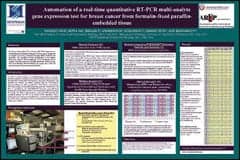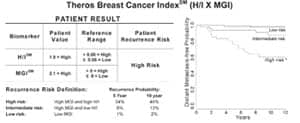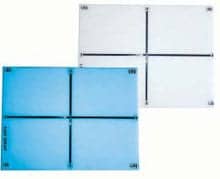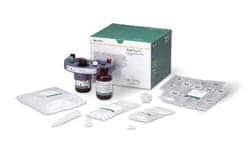CA 15-3/BR 27-29 Assays
Detects breast cancer recurrence
Siemens Healthcare Diagnostics, Deerfield, Ill, offers both the CA 15-3 assay and BR 27-29 assay, which aid in the detection of recurrence in previously treated Stage II and/or Stage III breast cancer patients and in the management of metastatic breast cancer patients.
Siemens Healthcare Diagnostics
www.siemens.com/diagnostics
 |
Breast Bioclassifier Assay
Predicts patient outcomes
ARUP Laboratories, Salt Lake City, introduces its Breast Bioclassifier™ a 55-gene qRT-PCR assay that classifies breast cancers into expression-based subtypes that more accurately predict patient outcome. ARUP uses AgenCourt FormaPure reagents and state-of-the-art automation from Beckman Coulter (Biomek®) to extract RNA from FFPE tissues in a 96-well format, reverse transcribe, and load the sample cDNA into premade 384-well plates that contain all the necessary reagents and controls to run the assay. The data is entered into customized software for performing quality control and normalization, before a final subtype and risk of relapse score is generated. The assay provides a readout of biological subtype (Luminal A, Luminal B, HER2, and Basal) and gives a continuous risk score that enables physicians to make treatment decisions based on estimates of survival probabilities given current therapies.
ARUP Laboratories
(800) 242-2787
www.aruplab.com
 |
THEROS Breast Cancer Index
Refines and improves risk stratification
The THEROS Breast Cancer IndexSM (BCI) from bioTheranostics, San Diego, is a molecular gene index that refines and improves risk stratification among patients with estrogen receptor (ER)-positive, lymph node-negative breast cancer. The assay is a combination of two gene indexes, THEROS H/ISM and THEROS MGISM, which independently evaluate distinct biological pathways. THEROS H/I is a two-gene index that stratifies ER-positive breast cancer into low or high risk for recurrence and is predictive of benefit from endocrine therapy. THEROS MGI is a five-gene index that provides quantitative and objective molecular assessment of tumor grade and proliferative status, stratifies breast cancers into low or high risk for recurrence, and identifies tumors likely to be sensitive or resistant to chemotherapy. A simultaneous assessment of the two gene indexes is available and provides independent and complementary prognostic information for use in treatment and disease-management decisions.
bioTheranostics
(858) 587-5870
www.biotheranostics.com
 |
AccuBoard
Clearly identify breast quadrants
AccuBoard™, from Mopec, Oak Park, Mich, is a valuable new tool for pathology laboratories in the battle against breast cancer consisting of two 10- x 14-inch, color-coded, cut- and abrasion-resistant boards specially manufactured from surgical-grade plastic. Each board features permanently imbedded, highly visible vertical and horizontal midlines. Using one of the color-coded, left- or right-breast grossing boards, pathologists simply identify each breast quadrant by orienting each specimen on the clearly marked board based on the board markings and the orienting sutures placed by the surgeon on the specimen. AccuBoard helps to eliminate the confusion that can result from changes in quadrant orientation, making it easier to locate smaller lesions.
Mopec
(800) 362-8491
www.mopec.com
 |
ADH-5 (Atypical Ductal Hyperplasia)
Breast marker antibody cocktail
Biocare Medical, Concord, Calif, introduces its new breast marker antibody cocktail, ADH-5 (Atypical Ductal Hyperplasia). This multiple staining Immunohistochemistry antibody is a cocktail of CK5, CK14, p63, CK7, and CK18. ADH-5 staining and interpretation is intended to solve multiple clinical problems, including differentiating hyperplasia of the usual type from atypical ductal hyperplasia, identifying microinvasion and invasive ductal carcinoma, and distinguishing basal phenotypes on triple negatives.
Biocare
(800) 799-9499
www.biocare.net
 |
CellSearch
Circulating tumor cell test
The CellSearch® Circulating Tumor Cell (CTC) Test from Veridex, Raritan, NJ, is a simple blood test that captures and assesses CTCs to determine the prognosis of patients with metastatic breast, colorectal, or prostate cancer at any time. The test offers objective, quantitative, real-time information concerning overall survival and progression-free survival so that oncologists can provide optimum care for their patients. The system is an advanced diagnostic platform used for metastatic cancer that offers accuracy, specificity, and reproducibility with state-of-the-art automation, and is the only laboratory platform that standardizes sample collection, cell capture, staining, and enumeration of CTCs.
Veridex
(877) 837-4339
www.veridex.com
Serum HER-2/neu
Monitors serum HER-2/neu levels
The unique Serum HER-2/neu assay, from Siemens Healthcare Diagnostics, Deerfield, Ill, is the only FDA-cleared blood test to monitor changes in the serum HER-2/neu levels. It is used to monitor levels of the HER-2/neu oncoprotein found in blood when metastatic breast cancer has been diagnosed. This test helps guide therapy for metastatic breast cancer patients by monitoring changes in the HER-2/neu oncoproteins.
Siemens Healthcare Diagnostics
www.siemens.com/diagnostics


